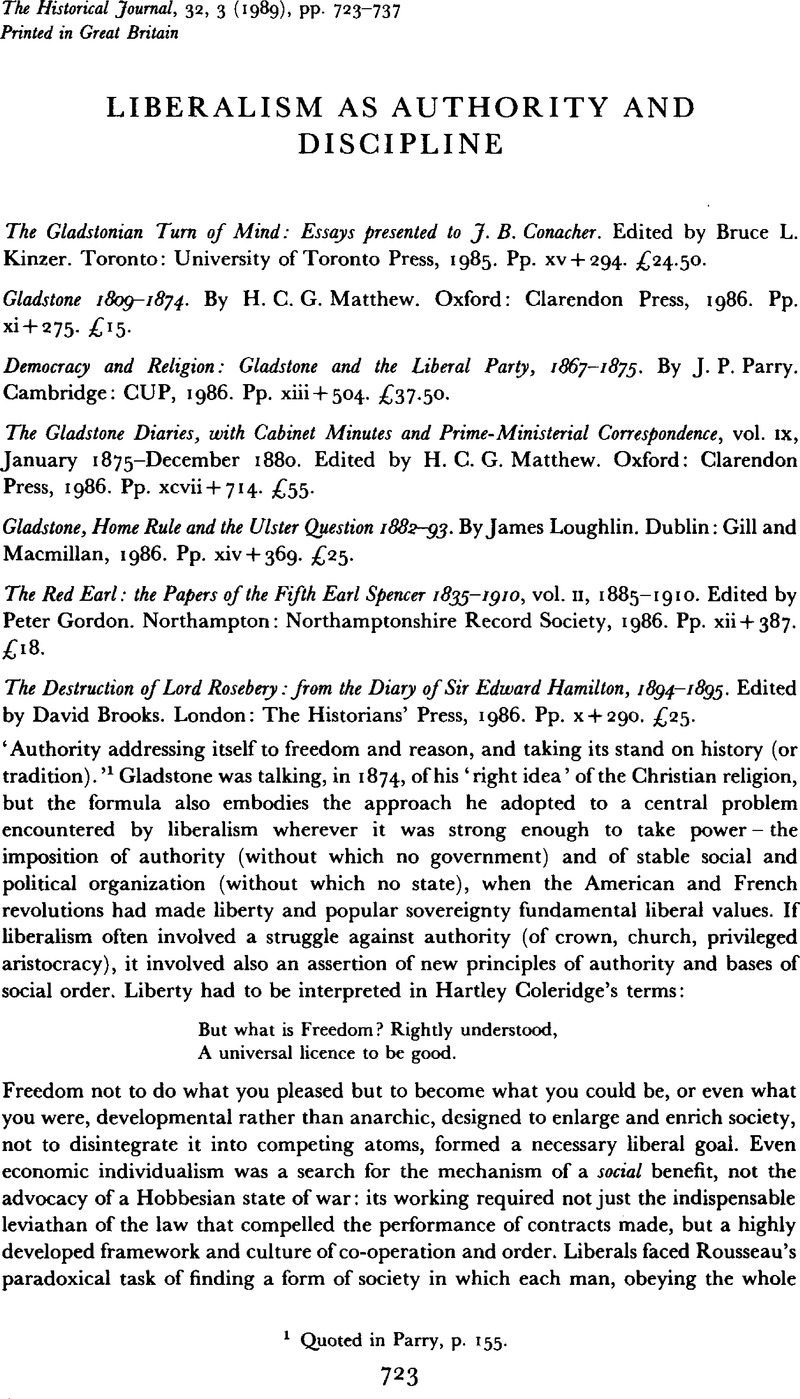No CrossRef data available.
Article contents
Liberalism as Authority and Discipline
Published online by Cambridge University Press: 11 February 2009
Abstract

- Type
- Review Articles
- Information
- Copyright
- Copyright © Cambridge University Press 1989
References
1 Quoted in Parry, p. 155.
2 Quoted in Morley, J., The Life of William Ewart Gladstone (3 vols., London, 1903), II, 133Google Scholar.
3 Ibi. III, 474–5.
4 ‘The making of Mr Gladstone's posthumous career: the role of Morley and Knaplund as “monumental masons”, 1903–27’, in Kinzer, , The Gladstonian turn of mind, p. 200Google Scholar.
5 Quoted ibid. p. 204, from a speech of 1890.
6 In the latter sphere, in addition to works discussed here, the most influential contributions have been: Butler, P., Gladstone: church, state and tractarianism: a study of his religious ideas and attitudes, 1809–1859 (Oxford, 1982)Google Scholar; Hilton, B., ‘Gladstone's theological polities’, in Bentley, M. and Stevenson, J. (eds.), High and low politics in modern Britain (Oxford, 1983), pp. 28–57Google Scholar; Ramm, A., ‘Gladstone's religion’, Historical Journal, XXVIII (1985), 327–40CrossRefGoogle Scholar.
7 Shannon, R., Gladstone, vol. I, 1809–65 (London, 1982)Google Scholar.
8 Some of them have received fuller development in two important articles by Matthew, , ‘Gladstone, Vaticanism and the question of the East’, Studies in Church History, XV (1978), 417–42CrossRefGoogle Scholar, and ‘Disraeli, Gladstone and the politics of mid-Victorian budgets’, Historical Journal, XXII (1979), 615–43Google Scholar.
9 Quoted in Matthew, pp. 26, 29.
10 Matthew, p. 63.
11 Matthew, p. 38.
12 Matthew, p. 45
13 ‘Conscience and politics: Gladstone's first book’, in Kinzer, , The Gladstonian turn of mind, pp. 3–42Google Scholar; Matthew, p. 253.
14 Quoted in Matthew, p. 34, whose text reads: ‘has a natural and binding right’.
15 Quoted by Helmstadter in Kinzer, , The Gladstonian turn of mind, p. 11Google Scholar, from The state in its relations with the church (1838).
16 p. 234, from ‘On the functions of laymen in the church’ (1851).
17 Quoted in Matthew, , p. 62, from The state in its relations with the churchGoogle Scholar. In 1873, however, informed by Manning of Hegelian influence at Oxford, Gladstone took the view that ‘German Philosophy has added but little to the stock of our knowledge of the mind & nature of men, if indeed it has added anything.’ The Gladstone diaries with cabinet minutes and prime-ministerial correspondence, vol. VIII, ed. Matthew, H. C. G. (Oxford, 1982), p. 287Google Scholar.
18 Cf. Taylor's, Charles definition, Hegel (Cambridge, 1975), p. 365CrossRefGoogle Scholar, of the dilemma of Hegel's generation: ‘how to combine the fullness of moral autonomy, with the recovery of that community, whose public life was expressive of its members and whose paradigm realization in history was the Greek polis’.
19 Matthew, p. 34, citing a MS of 1831.
20 Ibid. p. 77, where Matthew drags Gladstone halfway to utilitarianism: ‘It would go too far to say that Gladstone became at any stage in his career in any full sense a utilitarian, but those utilitarian aspects of his approach to society, noted above and criticized by Keble, certainly become more pronounced.’
21 Derek Beales, for instance, is critical of the consolidatory interpretation of Gladstone's first ministry in his discussion of Matthew's introduction to vols. VII–VIII a of the Diaries. Historical Journal, XXVI (1983), 993–5Google Scholar.
22 Quoted in Matthew, , Diaries, IX, lxxxix, n. 4Google Scholar.
23 See Howe, A., The Cotton Masters 1830–1860 (Oxford, 1984), pp. 240–1Google Scholar.
24 He told Lady Spencer in 1886 that the Liberal party ‘suffered from too much cleverness, and individuality in its members, and that vanity and originality seemed to go together.…’. The red earl, p. 113.
25 Schreuder, p. 232, quotes the well known passage claiming ‘an insight into the facts of particular eras, and their relations one to another’ from Gladstone's Autobiographica,
26 Quoted in Matthew, , Diaries, IX, lxv, from ‘Postscriptum on the county franchise’, in Gleanings of past years 1843–78 (1879)Google Scholar.
27 Taylor's, translation, Hegel, p. 393Google Scholar.
28 His speech to the Political Economy Club on the occasion of the centenary, in 1876, of the publication of The wealth of nations took the simple Cobdenite line that there was no more powerful agent than commerce ‘in consolidating an d in knitting together the amity of nations’. Quoted in Matthew, , Diaries, ix, xxxviiiGoogle Scholar.
29 Quoted in Gordon's, Peter introduction to The red earl, p. 3Google Scholar.
30 Checking and proofreading have been less admirable, and at times the text appears to suffer from mistranscription or misprinting, e.g. in items 415 (should ‘once more though’ read ‘one more thorough’?), 449 (should ‘but’ in the penultimate sentence read ‘that’?), 466 (is there a misreading in the last paragraph on p. 110 , which seems to run counter to the general sense of Spencer's views?), 694 (did the C-in-C French fleet really appear from ‘Toulouse’, rather than Toulon?). There are too many literals, and Lord Salisbury acquires a new daughter, Lady ‘Gwendoline’ Cecil (p. 318, n. 6).
31 At Accrington, 2 Dec. 1883. Holland, B., The Life of Spencer Compton, eighth duke of Devonshire (2 vols., London, 1911), I, 406Google Scholar.
32 Speech at Edinburgh, , 17 03 1894, quoted in Destruction of Lord Rosebery, p. 9Google Scholar.


